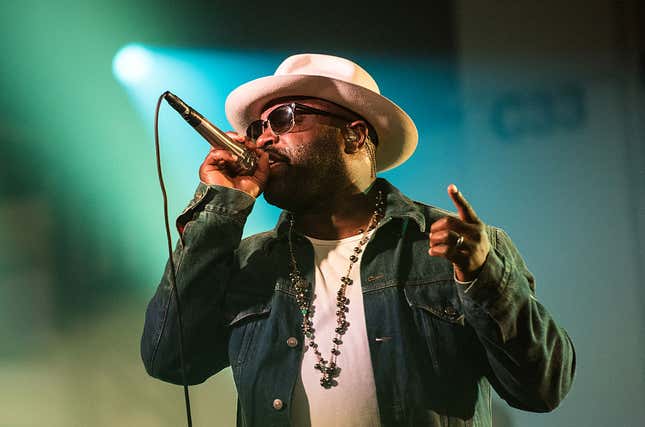
The new musical Black No More is set during the Great Depression and is based on a book of the same name. The musical explores race in the United States with the biggest twist in the plot being an inventor creating a device that turns Black people white, according to NPR.
The Roots rapper Black Thought, whose legal name is Tariq Trotter, stars in the musical, wrote the lyrics and most of the music featured, which includes Hip-hop, R&B, jazz and folk.
Black Thought’s character is the inventor of the Black No More machine, Dr. Junius Crookman, who for $50 will turn any Black person white.
According to NPR, Black Thought says the inventor thinks, “this Black No More device is the solution to race relations in America. I think the line is ‘to solve the American race problem as we know it.’ But yeah, you know, I don’t think a solution is ever reached.”
From NPR:
And that is the Twilight Zone-like premise of Black No More, which features a script by Academy Award-winner John Ridley. The 1931 novel, by George Schuyler, has a take-no-prisoners attitude toward not just white supremacists and politicians, but thinly veiled figures from the Harlem Renaissance, which choreographer Bill T. Jones finds offensive. “When I read the novel, I must admit I was kind of pissed off about it,” Jones says. “Yeah, I like bad boys, too. I don’t like smart asses, of course, and particularly when they’re Black ones making fun of Black people.”
So, the challenge for the creative team, especially the writers, was to move the story from broad satire to something with a beating heart, says director Scott Elliott: “I think that what they’ve come up with is a really fascinating morality tale.”
The central character, Max, is a man about town in Harlem, but he’s been beaten down by racism in his job and romance. So, he chooses to go through the Black No More process and ends up in Atlanta, where he becomes a powerful figure in a white supremacist organization, called the Knights of Nordica.
The actor who plays Max, the main character, is Brandon Victor Dixon, who says, according to NPR, “It is purely about perception in both its literal and figurative sense. People see him as white. He sees himself as white, but he’s still the same guy making the same mistakes. Like, nothing has changed.”
The catch is this, onstage, there is no physical transformation from Black to white. There is not a white actor, white clothing, or makeup, the director thought it would take away from the story.
Scott Elliot, the director, says according to NPR, “I thought it would be ridiculous ... because first of all, you can’t really do it. It would always be a facade. Right? And how do you have a facade on your main character whose heart you want to locate, whose guts you want to locate?”
More from NPR:
Tamika Lawrence plays Max’s friend Buni, who travels from Harlem to Atlanta to convince him to reveal his true identity. She says the show is emotionally engaging, with a love story and tragedy, but it also touches on broader themes: “I think it makes us ask a lot of questions about ourselves and the roles that we play in this American capitalistic, sometimes hedonistic and hegemonic society.”
And while the show has ambitions for Broadway, Tariq Trotter hasn’t watered down his own sense of sociopolitical commentary, which he brings to the Roots and his solo work, in the songs for the show. He says, “I’ve been able to stand on the same principles that I always have as an artist.”

